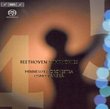| All Artists: Ludwig van Beethoven, Osmo Vänskä, Minnesota Orchestra Title: Beethoven: Symphonies 2 and 7 [Hybrid SACD] Members Wishing: 0 Total Copies: 0 Label: Bis Original Release Date: 1/1/2008 Re-Release Date: 8/26/2008 Album Type: Hybrid SACD - DSD, Import Genre: Classical Styles: Historical Periods, Classical (c.1770-1830), Symphonies Number of Discs: 1 SwapaCD Credits: 1 UPC: 675754009908 |
Search - Ludwig van Beethoven, Osmo Vänskä, Minnesota Orchestra :: Beethoven: Symphonies 2 and 7 [Hybrid SACD]
![Beethoven: Symphonies 2 and 7 [Hybrid SACD]](https://nationalbookswap.com/cd//l/98/0298/13210298.jpg) | Ludwig van Beethoven, Osmo Vänskä, Minnesota Orchestra Beethoven: Symphonies 2 and 7 [Hybrid SACD] Genre: Classical
|
Larger Image |
CD DetailsSimilar CDs |
CD ReviewsExcellent Beethoven - Definitive? Probably Not W. Chiles | San Francisco, CA USA | 03/11/2009 (4 out of 5 stars) "As a CD collector who's listened to a great many SACDs, thought I'd weigh in with my own impression of this fine recording. I believe there are many valid approaches to Beethoven, as different as those from Klemperer (weighty, ponderous, granitic) to Toscanini or Kleiber(lean, exciting) to Walter (mellow & warm) to Bernstein or Furtwangler (emotionally responsive) with room in the middle for approaches like Karl Boehms which were faithful to the score but with more relaxed attacks and a warmer approach from the Vienna Philharmonic. I also find that NO ONE conductor can master EACH symphony. Moreover, some orchestras, the Vienna Philharmonic in particular, have a tradition of performing these works with a sound like no other. I enjoyed this recording very much, particularly the 2nd for some interesting details Vanska reveals in the score that i've not heard elsewhere. The 7th was a fast, lean and exciting performance not altogether different from what i've heard from Kleiber, Toscanini or Szell. The recorded sound on SACD is remarkably lifelike, sounding as if you're sitting in front orchestra center. The strings come across a tad dry but the winds have a great deal of air and warmth about them reflecting the fine acoustics of Minneapolis' Orchestra Hall. I've never heard a concert there, but suspect it's similar and a bit superior to the Kennedy Center Hall which I know quite well. I think anyone who relishes state of the art sound will appreciate thie recording from a technical standpoint. SACD sound from DSD sources boasts a smooth response curve and a warm and deep sonic stage coming from multi-channel sources. It's truly like being there live. The performance demonstrates that this is an excellent orchestra with particularly fine woodwind players and balanced sections. The conductor has rehearsed them to a fare-thee-well and there is committment and energy in this recording. I would not recommend it to anyone with a conventional CD player necessarily, but if you want to hear Beethoven in this wonderful audiophile format, spring for it. You won't be disappointed unless you like your Beethoven more romantic ala Walter or Furtwangler." This last release of a very fine cycle is no disappointment Robert Buchanan | Wisconsin | 08/07/2009 (4 out of 5 stars) "The recording of Beethoven's second symphony on this disc isn't in any way exceptional, but it's quite good - good enough to spurn any notions of mediocrity. However, the real treat of this release is Vänskä's thrilling take on the seventh: an energetic, lively reading that results in an astoundingly robust performance, better than most (though the Toscanini/NBC recording is still superior to my ears). Although Vänskä and the Minnesota Orchestra have hardly broken new ground with this cycle, it's the best to be released in at least a decade - far better than anything produced by Europe's finest under the soggy, limp-wristed baton of Simon Rattle. More importantly, the fidelity of this recording and every other in this cycle is flawless, crisp, totally clear. If you're looking for the best-sounding Beethoven cycle that money can buy, I'm pretty sure that this is it." Excellent but not the best D. DEGEORGE | Ellicott City, MD USA | 05/26/2009 (4 out of 5 stars) "I regret to say that I am disappointed in this recording, probably because too high expectations were set by all the recent rave reviews. These are indeed very fine performances characterized by clarity, virtuosity, and brisk tempi; they have some nuance, although not a lot; and Vänskä interjects a few rhythmic twists in the Seventh that are rather interesting, while hewing to tempi that are probably closer than most to Beethoven's markings, in all movements except the last, which nearly all conductors take as fast as they dare. I found the tightness of the slow movement, achieved by a faster-than-average pace, refreshing. The recorded sound is full-bodied and clear with an especially nice balance across the entire frequency spectrum and with enough bass to support the power of this music, although I found the 2-channel mix to lack stereo spread and that the first violins sounded a bit harsh. Thus when I say I am disappointed, it is not because there is anything wrong with these performances, but only because I do not believe that they are all that special and certainly not the best.
So if these performances aren't "special," which ones would I recommend instead? George Szell was one of my favorite Beethoven conductors, and I still believe that his recording of Symphony No. 2 with the Cleveland Orchestra is the best. As much as I like Szell's Beethoven in general, however, I have other recordings that I prefer for most of the symphonies when considered individually; and that is the case with No. 7. My favorite may surprise you: Bruno Walter and the "Columbia Symphony." If you think of Walter as gentle or one who smoothes things out too much to possibly be suitable for Beethoven, listen to No. 7 and think again. It is, in fact, his willingness to bend and relax tempi that inform the third movement with a wonderful sense of hushed expectation; Vänskä on the other hand takes the "Presto" tempo marking much more literally. Walter, however, whips up the orchestra to an even greater frenzy than Vänskä in the last movement. Furthermore, I like the recorded sound better, even though the presence of a mild hiss belies its early-stereo origin, as does the slightly pinched sound of the rather prominently recorded trumpet. Walter's engineers produced a spacious sound with wide stereo separation, silken first violins and deliciously clear and rounded woodwinds. As some of you may be considering buying a complete set of the Beethoven symphonies, let me make another couple of points relating to Bruno Walter and George Szell. While my love of Bruno Walter's Beethoven Seventh may be thought to be a bit quirky, such is not the case with his recording of Beethoven's Sixth, "Pastoral." You will have no trouble finding reviews that declare it to be the best recording of that work of all time, and I agree. Szell excels, however, when it comes to numbers 2, 3, 5 and 8. My other recommendations include Fritz Reiner with Chicago for the First and Ninth (also Bernstein for the First and Toscanini for the Ninth). I have no choice for the Fourth. Finally, I have to say that I don't understand what the fuss is about concerning any of von Karajan's Beethoven cycles; and although I love the Berlin Philharmonic, the wimpy-sounding oboist(s) in the von Karajan recordings just don't fit the music to my way of thinking. Another recording of Beethoven's No. 7 that I suggest as superior to Vänskä's is the one by Dohnanyi and the Cleveland Orchestra, on Telarc. Dohnanyi's interpretation is one of the better ones and is roughly on a par with Vänskä's, but benefits from better recorded sound than the latter. The Telarc sound is rather surprisingly similar to that of the much earlier Walter recording, absent the hiss. Other recordings of Beethoven's Seventh that are worthy competitors to Vänskä's include those by Leonard Bernstein and the New York Philharmonic and George Szell's with the Cleveland Orchestra. As good as this recording of Beethoven's Second and Seventh symphonies is, there are simply too many preferable alternatives for me to agree with those who have crowned this one "the best ever." " |

 Track Listings (8) - Disc #1
Track Listings (8) - Disc #1![Beethoven: Symphony Nos. 3 & 8 [Hybrid SACD]](https://nationalbookswap.com/cd//m/96/0296/13210296.jpg)

![Beethoven: Symphony No. 9 [Hybrid SACD]](https://nationalbookswap.com/cd//m/97/0297/13210297.jpg)
